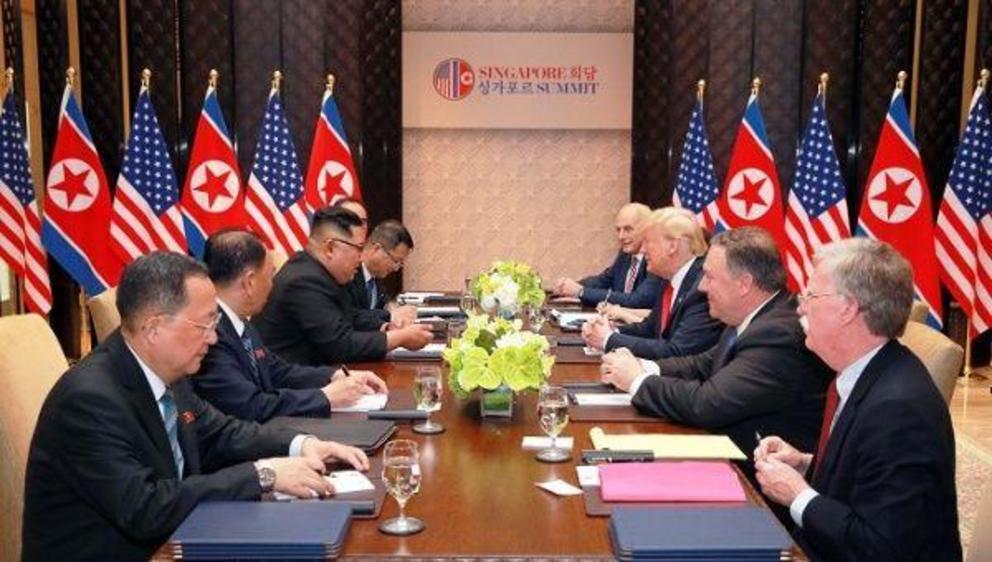Explainer: The US-North Korea Summit
Trump and Kim met in Singapore on Tuesday, but what does it mean moving forward and how are officials and experts reacting?
The U.S. President Donald Trump and North Korean leader Kim Jong-un came away from their Tuesday Singapore summit having signed a document that Kim says will "leave the past behind."
But, why was the meeting important? what’s in the document? What happens next? and what are people saying?
First, the meeting between the U.S. and North Korea leaders was history-making because the leaders of the two countries had never met. Their amicable encounter solidifies peace between the countries that have technically been warring for 65 years. Adding to that, a year ago Trump and Kim had escalated the threat of nuclear war between their countries to the highest point in seven decades and name called at each other like schoolboys.
The about-face by the two heads of states prompted even Kim to comment through an interpreter: "I think the entire world is watching this moment. Many people in the world will think of this as a scene from a fantasy...science fiction movie."
Kim and Trump's bilateral agreement is a brief one and half pages and includes four points:
1. The United States and the (Democratic People's Republic of Korea) DPRK commit to establishing new U.S.-DPRK relations in accordance with the desire of the peoples of the two countries for peace and prosperity.
2. The United States and the DPRK will join their efforts to build a lasting and stable peace regime on the Korean Peninsula.
3. Reaffirming the April 27, 2018 Panmunjom Declaration, the DPRK commits to work toward complete denuclearization of the Korean Peninsula.
4. The United States and the DPRK commit to recovering POW/MIA remains, including the immediate repatriation of those already identified.
What happens next? Trump said he would "absolutely" willing to invite the North Korean leader to the White House. For the moment, economic sanctions will remain against the country until the United States is satisfied that the "nukes are gone." What "denuclearization" looks like and exactly when it will happen still have to be hammered out.
Trump also, and unexpectedly, declared that the U.S. will suspend joint military exercises with South Korea, a comment that drew surprise from high ranking officials in both South Korea and the U.S.
In the more long-term, the Deakin University law professor, Sandeep Gopalan, predicts that once sanctions are lifted from North Korea the country will follow in the footsteps of China enabling a socialist regime to preside over an open market economy, bolstering the region's power to the detriment of the U.S.
What are the reactions to the summit? NATO, UN and Japanese officials applauded the "historic summit" and were extremely upbeat about the prospects of denuclearization of the Korean peninsula.
Other officials and experts aren’t as convinced that will happen, say the agreement is weak on detail and gives North Korea the upper hand.
Malcolm Cook, a fellow at the Lowy Institute in Australia said "It's pretty hard to be comprehensive in only one page," adding that the much-lauded document leaves "many questions unanswered, not so many answered." Russia’s Deputy Foreign Minister Sergei Ryabkov agreed, commenting that the "devil is in the detail, and we have yet to delve into specifics."
Vipin Narang, an Associate Professor of Political Science at MIT told Al Jazeera that North Korea came out the winner of the agreement. "There’s really nothing to enforce at this point. The text of the agreement is so vague that it’s not clear what could be enforced. Remember, North Korea hasn’t agreed to give up or suspend anything."
Cook concludes that neither side really won as neither fully committed to what was being asked of them. "There was no mention of verifiable, no mention of the word irreversible and no discussion of when US economic sanctions would go off."
What the future holds, according to Trump is that he and Kim will "meet again. We will meet many times."

